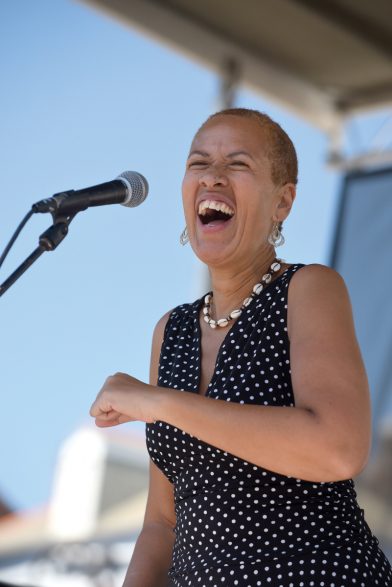Margie Perez’s Cuban heritage has her looking perhaps extra forward to listening, playing and eating at Jazz Fest this year.
Vocalist Margie Perez is so well versed in everything New Orleans—musically and culturally—that you’d think she was born and raised here. But no. She grew up in a Cuban family outside of Washington D.C. in a small, four-family Cuban community.
“D.C. wasn’t Miami,” she says. “We had just this one Latin market and my mom would make her once-a-week trip to buy the spices and the cuts of meat she needed, like flank steak for ropa vieja.”
She’d also buy adobo, a salty seasoning mix dominated by garlic, lemon and oregano, which Margie Perez keeps in her kitchen in New Orleans as well.
“I love to make mojo sauce, and it’s in almost everything,” she says. “Pork roast or steak, you marinate it in this mojo sauce and keep basting it in the oven—it’s incredible.”

Margie Perez’s Mom’s Cuban Flan
Caramel glaze:
1 cup sugar
Flan filling:
6 eggs
14 ounces whole milk
1 (14-ounce) can sweetened condensed milk
1 can coconut with syrup (found in the baking section, optional)
Preheat oven to 450 degrees.
Start by making the glaze. Heat sugar in a small saucepan over low heat. Simmer gently until sugar caramelizes into thick syrup, stirring constantly. Immediately pour syrup into a loaf pan or baking dish, tilting so the syrup covers not just the bottom but also the sides. (Take care not to get burned!) Chill quickly in the freezer.
Next, make the filling. Combine eggs, milk, condensed milk and coconut in a blender. Process until the mixture is all one color.
Remove glaze from freezer. Pour in filling, leaving at least 1/2 inch at the top. Place the pan inside a larger pan to which you add enough water to reach about halfway up the flan pan. Bake in the oven for about 60 minutes (cook time varies greatly depending on the width of the pan), checking every 15 minutes. Once the top is golden and a knife comes out relatively clean, take the flan out and let it cool on the counter for 30 minutes—then cool in the refrigerator for at least 8 hours.
To serve, loosen sides with a knife. Invert pan onto a plate. It’s a beautiful sight to see all the caramel syrup drip down the sides of this masterpiece. Margie highly recommends that you do this part in front of an audience.
Note: There are many flavors you can add during the blending process, including a cup of strawberries, bananas or a block of cream cheese. Margie made pumpkin flan for Thanksgiving. Photo by Kim Welsh
Perez admits she’s more familiar with Cuban food than she is with Cuban music, since cords between her parents’ island and the U.S. were literally cut before her birth, after Fidel Castro’s rise to power in 1959 and the Cuban missile crisis in 1962. Her mother’s cooking came to reflect the family’s double belonging, being Cuban and becoming American—or at least Cuban-American.
“Growing up, my mom cooked everything in the Cuban style, even when the food wasn’t Cuban,” Perez remembers. “Like, her spaghetti was Cuban. There’s this Cuban dish called picadillo, kind of like sloppy joes. You fry the meat with adobo first, and after that it tastes Cuban, no matter if you add tomato sauce and pour it over spaghetti. With adobo, it’s no longer Italian.”
Perez encountered a similar mix of strange and familiar when she first tasted the foods of New Orleans. Jambalaya, or arroz con pollo? Red beans and rice, or rice and beans? The classic “holy trinity” that’s added to almost any traditional Louisiana pot of food (be it Cajun or Creole), with onion, bell pepper and celery—or rather onion, bell pepper and garlic? The connections between her mother’s cooking and New Orleans cuisine were obvious. There was simply less cumin and more cayenne pepper.
At Jazz Fest, Perez makes a point of eating Cuban sandwiches (“Delicious—and the guy’s not even Cuban!”) and fried plantains (from Bennachin’s West African food stand). She hopes to hear as much of the Cuban music as she can between her own sets, with percussionist Michael Skinkus and Moyuba on the first Friday and her own band Muévelo on Thursday. She promises sweet sounds that will be—as they should be—both familiarly strange and strangely familiar.
“Imagine all of the collaboration that could have happened between Cuban and New Orleans musicians in the last fifty years,” she ponders. “There is so much to make up for.”
As we wait for those sweet sounds, Perez vows to tide us over by sharing her recipe for flan, below.
Muevelo featuring Margie Perez plays on Thursday, May 4 at 1:50 p.m. on the Lagniappe Stage.




